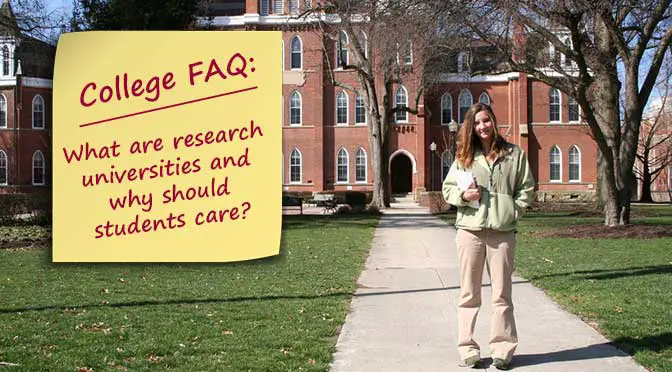 Before parents sit back and let their kids drive the college application process, there are some numbers they need to understand when comparing colleges. Because while it’s true that it’s the student who is going to attend college, the colleges are pretty clear that they are going to turn to the parents to pay the bill. And anyone expected to write a check to cover the cost of college, needs to have some meaningful numbers to evaluate the value of what their buying. However, not all numbers are created equal. For example, the acceleration speed of a car and its sticker price are both numbers, but one probably will have priority over the other for most people making a car purchase. Understanding these five numbers will provide you with some basic references for comparing colleges to decide if you’re willing to pay the college’s asking price.
Before parents sit back and let their kids drive the college application process, there are some numbers they need to understand when comparing colleges. Because while it’s true that it’s the student who is going to attend college, the colleges are pretty clear that they are going to turn to the parents to pay the bill. And anyone expected to write a check to cover the cost of college, needs to have some meaningful numbers to evaluate the value of what their buying. However, not all numbers are created equal. For example, the acceleration speed of a car and its sticker price are both numbers, but one probably will have priority over the other for most people making a car purchase. Understanding these five numbers will provide you with some basic references for comparing colleges to decide if you’re willing to pay the college’s asking price.
College Characteristics
7 Useful Ways to Compare Colleges
 If you have kids old enough for you to be thinking about the college admissions process and how you’ll pay for it, you also need to be thinking about how you’re going to compare colleges. Because the fact is that you’re going to be comparing lots of colleges, the sooner the better. You’re going to compare colleges when you decide which colleges to visit, which admissions reps to talk to at the college fair, which colleges to apply to, and which one to ultimately attend. So take this opportunity to consider the various ways you can actually compare colleges and their relative worth to your family’s situation.
If you have kids old enough for you to be thinking about the college admissions process and how you’ll pay for it, you also need to be thinking about how you’re going to compare colleges. Because the fact is that you’re going to be comparing lots of colleges, the sooner the better. You’re going to compare colleges when you decide which colleges to visit, which admissions reps to talk to at the college fair, which colleges to apply to, and which one to ultimately attend. So take this opportunity to consider the various ways you can actually compare colleges and their relative worth to your family’s situation.
10 Essential Clues Students Miss When Researching Colleges
 Unless you’re willing to just pick one set of college rankings and use it to decide between colleges, at some point you’re going to have to dig deeper and actually start researching colleges. The fact is that once you get past adding or removing colleges from your list based on things like size, majors, and locations, most students will still need to narrow down their lists. There’s no magic formula for deciding between schools–what’s important to one student won’t be for another. And given the cost of college, students should commit to researching them further to find their differences. But how do you research a college?
Unless you’re willing to just pick one set of college rankings and use it to decide between colleges, at some point you’re going to have to dig deeper and actually start researching colleges. The fact is that once you get past adding or removing colleges from your list based on things like size, majors, and locations, most students will still need to narrow down their lists. There’s no magic formula for deciding between schools–what’s important to one student won’t be for another. And given the cost of college, students should commit to researching them further to find their differences. But how do you research a college?
It Takes More Than Rankings to Find Good Colleges
 Why? Because it all depends on how you define good colleges.
Why? Because it all depends on how you define good colleges.
And that’s the problem. How do you know what makes a college “good?” Are good colleges the ones where the good students go? After all, the colleges that admit only a small percentage of students with high GPAs and college test scores are the ones that show up at the top of the college rankings. But does that mean the school is good because it admits good students or do good students go there because it is a good college?
Are They the Best Colleges in Texas for You?
 With 81 public and private higher education institutions with 500 or more full-time undergraduates in Texas, how do you decide which are the best colleges in Texas? Well, a lot of people will just look at US News Best College Rankings and consider it problem solved. In that case, the list of best colleges in Texas is easy:
With 81 public and private higher education institutions with 500 or more full-time undergraduates in Texas, how do you decide which are the best colleges in Texas? Well, a lot of people will just look at US News Best College Rankings and consider it problem solved. In that case, the list of best colleges in Texas is easy:
US News Best Texas Colleges Ranked Nationally
Rice University (16)
The University of Texas at Austin (42)
Southern Methodist University (66)
Texas A & M University (66)
Baylor University (76)
Texas Christian University (80)
14 Unique Reasons to Attend SEC Schools Besides Sports
 If big-time college sports are an important consideration for your college list, you’ll need to take a look at the Southeast Conference (SEC) schools. If I have to tell you why you should consider SEC schools for big-time sports, then we are definitely working with different definitions or you have been living under a rock since sometime in the last century. SEC schools claim 43 national football championships, 21 basketball championships, 13 College World Series, and 20 gymnastics championships among many others. Yet, the 14 universities that make up the SEC Conference, actually have a lot to offer other than sports.
If big-time college sports are an important consideration for your college list, you’ll need to take a look at the Southeast Conference (SEC) schools. If I have to tell you why you should consider SEC schools for big-time sports, then we are definitely working with different definitions or you have been living under a rock since sometime in the last century. SEC schools claim 43 national football championships, 21 basketball championships, 13 College World Series, and 20 gymnastics championships among many others. Yet, the 14 universities that make up the SEC Conference, actually have a lot to offer other than sports.
FAQ: What are research universities and why should students care?
 Defining a Research University
Defining a Research University
Research Universities are Large
Research Universities are Focused on Faculty Research
Best Research Opportunities
List of Research Universities in the United States
Defining a Research University
A research university is simply a type of university that conducts more research relative to other colleges and universities. American universities are defined as research universities by the Carnegie Classification of Doctoral Universities. A university is considered a Doctoral University if it
- awards at least 20 research/scholarship doctoral degrees
- or awards at least 30 professional practice doctoral degrees in at least two programs.
To meet the “High research activity” or “Very high research activity,” the Doctoral University must:
- award at least 20 research/scholarship doctoral degrees and
- had at least $5 million in total research expenditures.
If you define research universities as only those with “Very high research activity,” there are only 130 in the United States. These are pretty much the most recognizable names in higher education including private institutions such as:
50-50 Highlights: Colleges in Chicago
 Students looking for the big city attractions shouldn’t overlook colleges in Chicago. It’s the 3rd largest city in the United States and has all the expected amenities to go with it. There are 39 colleges with at least 500 full-time undergraduates in the Chicago Core Based Statistical Area (CBSA). While 14 of them are 50-50 colleges, unfortunately only one is a public institution.
Students looking for the big city attractions shouldn’t overlook colleges in Chicago. It’s the 3rd largest city in the United States and has all the expected amenities to go with it. There are 39 colleges with at least 500 full-time undergraduates in the Chicago Core Based Statistical Area (CBSA). While 14 of them are 50-50 colleges, unfortunately only one is a public institution.
DIY College Rankings: Where to Start
 As I went through the college search process with my son, I was constantly amazed at the way numbers are and are not used in the process. Everyone talks about student’s GPA, class rank, test scores, and college acceptance rates but no one seemed to know anything about their Expected Financial Contribution (EFC), four-year college graduation rates, or percentage of students receiving non-federal student loans.
As I went through the college search process with my son, I was constantly amazed at the way numbers are and are not used in the process. Everyone talks about student’s GPA, class rank, test scores, and college acceptance rates but no one seemed to know anything about their Expected Financial Contribution (EFC), four-year college graduation rates, or percentage of students receiving non-federal student loans.








